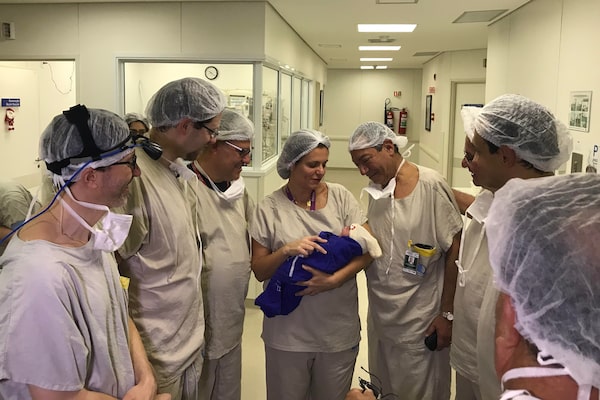
The medical team at the Hospital das Clinicas holding the first baby to be born following a uterus transplant from a deceased donor.Divulgação Hospital das Clínicas da FMUSP.
A woman in Brazil is the first in the world to give birth following a uterus transplant from a deceased donor in a medical milestone that potentially offers another treatment option for women with uterine-related infertility.
In a case study published in the Lancet journal on Tuesday, doctors who performed the surgery at the Hospital das Clinicas at the University of Sao Paulo describe how they successfully transplanted a uterus from a deceased donor into a 32-year-old woman born without one. She gave birth to a baby girl on Dec. 15, 2017, by caesarean section. The donor was a 45-year-old who died after a stroke that caused bleeding on the surface of the brain.
Uterus transplantation is a relatively new area of medicine. Until now, the only successful uterus transplants have involved living donors who are typically family members of the recipients. The first of these occurred in Sweden in 2013 and since then, 11 babies have been born after similar procedures, according to the Lancet. Deceased-donor uterus transplants have been attempted in the past few years, but none resulted in the birth of a healthy baby.
The use of a deceased donor is a significant achievement that could greatly increase access to the procedure, said Stefan Tullius, chief of transplant surgery at Brigham and Women’s Hospital in Boston who has participated in living-donor uterus transplant surgery. Those transplants can only be done for women who find a donor, who must undergo a complicated surgery and lengthy recovery, Dr. Tullius said.
“This is a great alternative compared to live-donor uterus transplants and therefore a really historic achievement,” said Dr. Tullius, who is also a professor of surgery at Harvard University. “There is the potential for uterus transplantation becoming mainstream.”
Women who would be candidates for a uterus transplant would have absolute uterine infertility, meaning they don’t have a uterus or that it is too damaged to support a pregnancy. This affects approximately 3 per cent to 5 per cent of women, Dr. Tullius said, including those born without a uterus or those who have had hysterectomies for cancer-related reasons. The mother in the Brazil case was born without a uterus as a result of Mayer-Rokitansky-Kuster-Hauser syndrome.
Canadian Fertility and Andrology Society president Clifford Librach said the challenges of transplant surgery, the need for immunosuppressing drugs to stop organ rejection that could affect the fetus and other potential risks are big factors that will likely keep this surgery from becoming commonplace. Women can instead pursue gestational surrogacy in order to have children in countries such as Canada, he said.
“That’s the simpler solution,” Dr. Librach said.
But Dr. Tullius said surrogacy comes with its own challenges, from compensation to the ethics of asking a woman to undergo the rigours of pregnancy. Uterine transplants can sidestep these issues and allow women who otherwise wouldn’t be able to have the chance to carry their own pregnancies.
He said any doubts he had about the potential importance of uterus transplants were erased after meeting the mother of the first baby born after a live-donor transplant. “This event really changed her life,” Dr. Tullius said.
Since then, he has participated in a live-donor surgery, during which an identical twin donated her uterus to her sister, who was born without one.
In a commentary published with the Lancet case study, two researchers suggest that, as more successful uterus-transplant surgeries are performed, it may be possible to expand the eligibility criteria. They cite women with inoperable fibroids, or abnormal uterine growths, those who have experienced embryo implantation failure and those who have received pelvic radiation as categories of women who may be able to benefit from uterus transplantation in the future.
 Carly Weeks
Carly Weeks